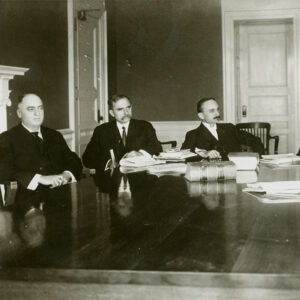calsfoundation@cals.org
John Paul Ward (1890–1972)
John Paul Ward was a lawyer and politician from Independence County who spent the last twenty-six years of his career as a trial and appellate judge. He was an associate justice of the Arkansas Supreme Court from 1951 until 1968.
John Paul Ward—who went by Paul—was born on February 20, 1890, in Batesville (Independence County), the son of W. J. Ward and Mollie Churchill Ward. He was educated in the Batesville public schools, received a bachelor’s degree at Arkansas College (now Lyon College) in Batesville in 1912, attended Tulane University in New Orleans, and received a law degree at the University of Oklahoma in Norman in 1915. When the United States entered World War I, he enlisted and became a commissioned officer in the American Expeditionary Force’s hundred-day offensive, the Meuse River-Argonne Forest Campaign in France, during the fall of 1918, the second deadliest battle in U.S. history.
After the war, Ward ran an abstract company at Batesville, started a law practice, and was mayor of Batesville from 1921 to 1923. He married Inarea McKenzie; they reared two sons and a daughter.
He was elected to the Arkansas Senate from Independence County twice during the Great Depression, in 1930 and 1934. Governor Carl Bailey appointed him to the state Industrial Board in 1937. In 1942, Ward was elected chancery judge for the Eighth Judicial District and was reelected in 1948 with the endorsements of every lawyer in the district.
When Frank G. Smith, who had been justice of the Arkansas Supreme Court for thirty-eight years, retired in 1949, Judge Ward ran to finish his term and was elected. He was elected twice more for eight-year terms on the Arkansas Supreme Court and retired at the end of the last term, in 1968.
Justice Ward could not be categorized as either liberal or conservative in interpreting the constitutions and statutes on economic and social matters. However, like all the Arkansas justices during the fraught early stages of the civil rights movement in the 1950s and 1960s, Ward tended to go along with punitive laws enacted by the legislature and signed by Governor Orval E. Faubus—laws that were intended to intimidate and punish the National Association for the Advancement of Colored People (NAACP) and other groups and individuals that favored racial integration or social justice. Among the statutes were the Bennett laws, so named for Attorney General Bruce Bennett, who authored them. The most famous was Act 10 of 1958, which required teachers in public schools and colleges to sign affidavits listing organizations to which they belonged or that they supported and making it a criminal act to sign a misleading affidavit. Bennett said the laws were to “throw consternation into the ranks” of the NAACP and other groups. The Arkansas Supreme Court justices, with occasional individual exceptions, upheld the acts, which were then struck down by the U.S. Supreme Court as unconstitutional in such cases as Daisy Bates v. City of Little Rock. After the U.S. Supreme Court reversals, a majority of the Arkansas court, including Justice Ward, then struck down segregation laws, although on the premise that the U.S. Supreme Court surely would do so.
As Ward was retiring from the court, Arkansas was engaged in rewriting the state’s 1874 constitution and liberalizing restrictive and reactionary provisions enacted to thwart Reconstruction after the Civil War. Two of the court’s outgoing justices, Ward and Justice Ed F. McFaddin, were outspoken champions of the proposed new constitution’s ratification or rejection campaigns in 1970. Ward said his thirty years as a judge and senator persuaded him that Arkansas would benefit from a modernized constitution. McFaddin, his ultraconservative colleague, led the opposition to the new charter, which he said would lead to high taxes and repressive state and local governments. Despite support by the two gubernatorial candidates that year—Winthrop Rockefeller and Dale Bumpers—voters rejected the document.
Governor Bumpers appointed Ward to the state Justice Building Commission, which planned the construction of a new Justice Building on the Arkansas State Capitol grounds.
Ward died on November 10, 1972. He is buried in Oaklawn Cemetery in Batesville.
For additional information:
“Former Justice Dies at Age 82.” Arkansas Gazette, November 10, 1972, p. 1B.
Ernest Dumas
Little Rock, Arkansas
 Law
Law Politics and Government
Politics and Government World War II through the Faubus Era, 1941 through 1967
World War II through the Faubus Era, 1941 through 1967 Supreme Court Members
Supreme Court Members 




Comments
No comments on this entry yet.